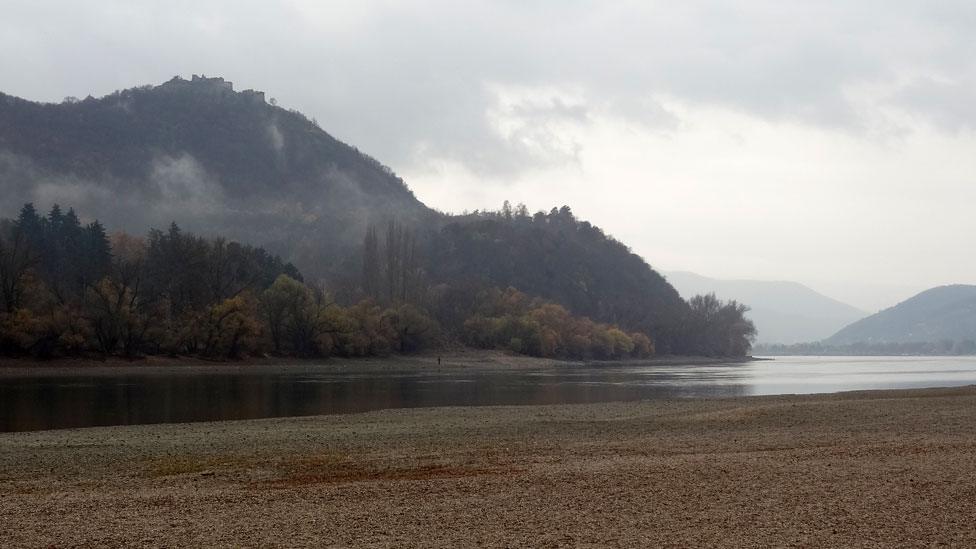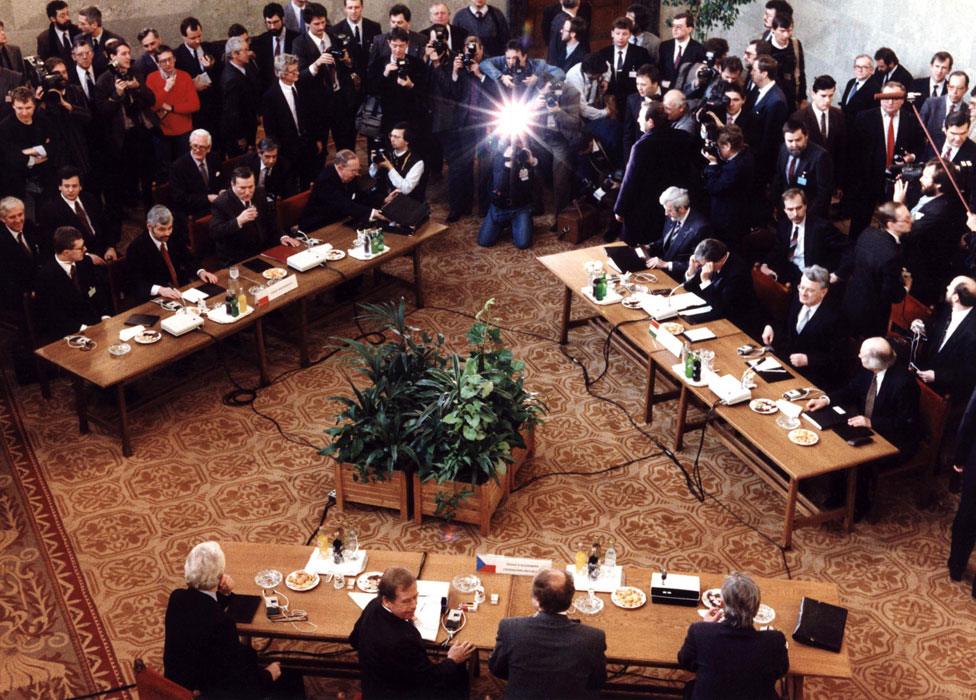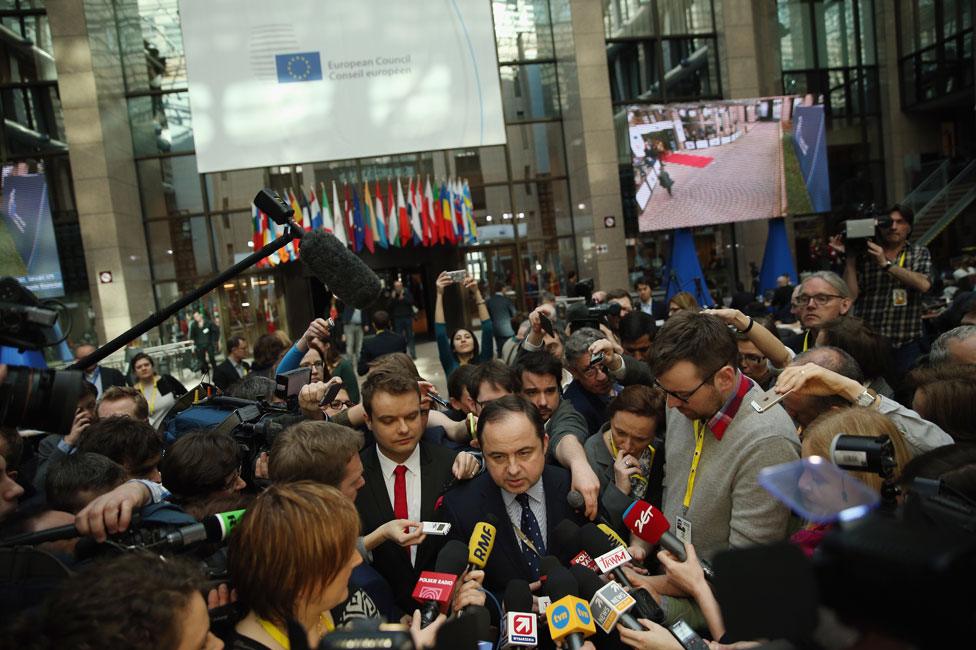Visegrad: The castle where a Central European bloc was born
- Published

The Central European countries of the Visegrad Group - the Czech Republic, Hungary, Poland and Slovakia - emerged as a bloc no-one can ignore at this week's European summit. But now that the group is finally pulling its weight, might it also pull Europe apart?
There are seven Visegrads on my map of Europe - not surprising as it means "high castle" in Slavic languages - but only one in Hungary. The River Danube turns 90 degrees here. The tip of Szentendre island stretches in midstream, bare shingle when the water level is low, a swirling onslaught of driftwood caught in the willow branches, at full flood - while overhead, the castle peers down at the river like the captain on the bridge of his ship, appearing and disappearing in the mist.
This is a place which invites lofty plans. In 1335, Charles Robert, King of Hungary, John of Luxembourg, King of Bohemia, Casimir the Third of Poland and assorted Bavarians, Saxons and Moravians met here to clinch a trade alliance against the Austrian Hapsburgs. They didn't hurry summits in those days. This one took a leisurely three-to-four weeks. Some 180 barrels of wine, and 2,500 loaves of bread were on the menu.
In February 1991, in the wake of the collapse of communism, I came here to witness the birth of the Visegrad Group of countries - Czechoslovakia, Hungary and Poland. The idea was that they would help each other in their efforts to join the European Union.

Lech Walesa has a drink (left) before the press conference at Visegrad in February 1991, while Vaclav Havel (bottom) turns and glances behind him
When I asked the leaders some innocuous question at the press conference, Lech Walesa, the founder of the Solidarity Trade Union, snarled his response. "If you're so clever," he said, "why don't you become President of Poland?" Even Vaclav Havel's attempt to answer my question didn't heal my wounded pride.
Not much came of the Visegrad Group then. They were too busy competing to be first in the club, though in the end they all joined together, on Mayday, 2004.
The other day they marked their 25th anniversary, with a birthday party in Prague. Now, at last, the Visegrad four - Hungary, Poland, the Czech Republic and Slovakia - have a common purpose. Strangely though, it's a negative one: to keep the migrants out of Europe.

Find out more
From Our Own Correspondent has insight and analysis from BBC journalists, correspondents and writers from around the world
Listen on iPlayer, get the podcast or listen on the BBC World Service or on Radio 4 on Thursdays at 11:00 and Saturdays at 11:30

The air is thick with the din of battle. "Chancellor Angela Merkel's plan to persuade Turkey and Greece to slow the flow of migrants will never work!" they say. "The idea of flying 300,000 carefully screened refugees each year into Europe, to stop them risking their lives at sea, will dilute Christian Europe!" They've also issued an ultimatum: if the Merkel plan isn't working by mid March, they will join forces with Macedonia and Bulgaria to shore up Europe's defences on their own, sending Hungarian razor wire, and police and soldiers to defend a wall as tough as the Israelis have built in the occupied West Bank.
The hope of the Visegrad countries is that behind this wall, Europe, and especially the Schengen group of countries, can return to normal - a border-free zone where we can all travel freely and trade nicely with each other, as we did before. Instead, many in Europe blame the Visegrad group for sabotaging German-led efforts to reach a Europe-wide agreement: managing the in-flow of genuine refugees at acceptable levels, and dividing them fairly. That dispute, along with David Cameron's efforts to reform the European Union, has driven many to doubt the future of such a disparate bunch of 28 nations. The irony is that, by finally pulling their weight, the Visegrad countries actions may have the opposite effect - a Europe falling apart into clusters of countries going their own way - just when the British government thought it had found a solution to the puzzle of British membership.

Journalists scramble to speak to a Polish minister at the European summit
"The European model is dead," Jean Michel de Waele of the Free University of Brussels told the website, Euractiv. "Our future model should be based on a core of six or seven countries that are capable of real political union." The solidarity he believes lies at the heart of the Union, is not shared by the countries of Central Europe. Instead, he wrote, "they are dripping with visceral xenophobia".
At the roadside in Asotthalom in southern Hungary last August, before Hungary erected its first, archetypal fence, I met a group of weary migrants from the Democratic Republic of Congo. I'm still in touch with several. Eric is in Paris, and due to be deported back to Hungary any day now. Aristote is in France too, in a town run by the anti-migrant Front National, after months living rough on the streets of Brussels with his pregnant wife. Their baby was born last month. Her name is Taslimah - derived from the Arabic "salam" meaning "peace". How are the three of you now? I asked. "On s'accroche," - he replied. "We're clinging on." Like birds on the cliffs at Visegrad.
Subscribe to the BBC News Magazine's email newsletter to get articles sent to your inbox.